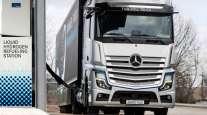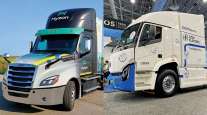Senior Reporter
Daimler Trucks Touts Global Plan for Vehicle Electrification

[Stay on top of transportation news: Get TTNews in your inbox.]
Daimler Trucks announced hydrogen fuel cell heavy-duty trucks with a range of 621 miles (1,000 kilometers) on a single tank will be a key element of its global electrification strategy aligned with the goals of the Paris Climate Protection Convention.
Daimler Trucks plans to begin customer trials of the hydrogen fuel cell GenH2 Truck in 2023 with series production to start in the second half of the decade, according to a company release. The truck will use liquid with its higher energy density compared with gaseous hydrogen, and the vehicle’s performance is intended to equal that of a comparable conventional diesel truck.
The truck maker noted the tanks of a fuel cell truck using liquid hydrogen are much smaller and, due to the lower pressure, significantly lighter. This gives the trucks a larger cargo space and higher payload weight.
Daimler Trucks is pursuing similar vehicle schedules for the North American and Japanese markets as it is for Europe. The truck maker debuted the Mercedes-Benz GenH2 Truck as a concept vehicle during an event in Stuttgart, Germany, on Sept. 16.
“Our customers make rational purchasing decisions and are unwilling to compromise on their trucks’ suitability for everyday use, tonnage and range,” Daimler Truck AG Chairman Martin Daum said in a release. “With our alternative drive concepts from Mercedes-Benz — the GenH2 Truck, the eActros LongHaul and the eActros — and our electric trucks of the Freightliner and Fuso brands, we have a clear focus on customer requirements and are creating genuine locally CO2-neutral alternatives for them.”
Freightliner is a brand of Daimler Trucks North America and the Class 8 leader in U.S. retail sales.
Daimler Trucks presents its way to a hydrogen future. https://t.co/W6QgVRNndp — Daimler Trucks & Buses (@DaimlerTruckBus) September 16, 2020
In April, Daimler Truck AG and Volvo Group reached a preliminary agreement on a joint venture to develop, produce and commercialize fuel cell systems in heavy-duty vehicles by the second half of the decade. They noted joining forces will decrease development costs for both companies and accelerate the market introduction of fuel cell systems.
The joint venture will operate as an independent and autonomous entity, with Daimler and Volvo continuing to be competitors in all other areas of business.
At the Stuttgart event, the truck maker announced it projected series production would begin in 2024 on the Mercedes-Benz eActros LongHaul, a battery-electric truck for regional operations with a range of about 300 miles.

The heavy, battery-electric eActros has been in customer testing since 2018. (Daimler AG)
Also, the Mercedes-Benz eActros, a battery-electric truck with a range of more than 124 miles for heavy urban distribution is expected to go into series production next year.
The company’s larger ambition is to offer only new vehicles that are CO2-neutral in driving operation — from tank to wheel — in those regions by 2039.
Underpinning these efforts is a new worldwide modular platform architecture, the so-called ePowertrain. It will be the technological basis of all medium- and heavy-duty CO2-neutral, all-electric series-produced trucks from Daimler Trucks, whether powered purely by batteries or by hydrogen-based fuel cells.
With the ePowertrain, Daimler Trucks plans to achieve synergies and economies of scale for all relevant vehicles and markets, the company noted.
Want more news? Listen to today's daily briefing:
Subscribe: Apple Podcasts | Spotify | Amazon Alexa | Google Assistant | More




